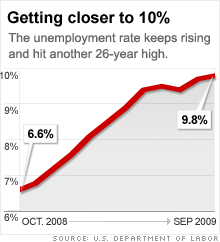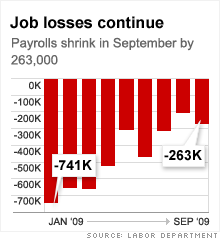Take this jobless recovery and shove it!
Economists argue that job growth always lags following a recession. But this time may be different. It's hard to have a recovery with unemployment near 10%.



NEW YORK (CNNMoney.com) -- Australia's raising interest rates! The global recession is over! The only question now is how strong and fast the economic rebound will be. Hip hip hooray!
Not so fast. I hate to ruin the celebration. But before you throw another shrimp on the barbie, consider this. All the talk about whether or not the economy is currently in the midst of a U-shaped, V-shaped, W-shaped, L-shaped or J-shaped recovery misses the point.
Sure, the recession may technically be over and stocks are rallying once more on hopes that the economy may finally be growing again. But as long as people continue to worry about their jobs -- and with good reason -- it's unlikely that any rebound will feel like a recovery to the people that matter most: consumers.
Most major U.S. companies are not expected to report much in the way of revenue growth during the third quarter. And the fourth quarter may not be anything to write home about either.
The National Retail Federation announced Tuesday that it expects sales during the holiday shopping season to be down 1% from last year. In its forecast, the NRF cited concerns about job losses and anemic wage growth as primary reasons why consumers are likely to spend less.
Simply put, the notion that unemployment can be dismissed as a lagging indicator and that the economy can enjoy healthy growth in a so-called jobless recovery may be a myth.
"You can't really call an end to the recession until we have a better situation in the labor market. We are not going to have a strong, sharp recovery unless there are gains in the job market," said Oscar Gonzalez, an economist with John Hancock Financial Services in Boston.
This recession has been considerably worse for average workers than the one in 2001. More than 7.2 million jobs have been lost in the past 21 months. That is staggering.
By way of comparison, 2.7 million jobs were lost during the 30 months stretching from March 2001 (the beginning of the previous recession) and August 2003 (the last month of job losses prior to the early stages of the credit crisis in the summer of 2007)
Unemployment hit 9.8% in September, and even the most bullish economists would admit that the jobless rate hasn't peaked yet. During the last economic slowdown, the unemployment rate peaked at 6.3% in June 2003.
And these are just the main headline numbers -- which don't tell the true story of how bad the job market is.
The Labor Department also reports a so-called underemployment rate, a figure that counts people who are working part-time because they can't get a full-time job, as well as discouraged workers who've given up trying to find a job.
Last month, the underemployment rate hit 17%. During the previous downturn, it went no higher than 10.4%.
It's also worth pointing out that the 2001 recession was largely brought about by a plunge in business spending after the tech bubble burst. That downturn didn't hit consumers as hard as this one, and was also widely confined to the coasts. If you weren't working on Wall Street or Silicon Valley, it was a fairly mild recession.
"The 2001 recession was sort of an oddball recession. The stock market bubble popped but housing did well after that so you didn't have as many jobs lost," said Ray Stone, an economist with Stone & McCarthy Research Associates in Princeton, N.J.
But the current recession has had a profound impact on all Americans. And it hit people where it really hurts. It's one thing when the value of your stock portfolio is decimated. It's another when the value of your home plummets and you risk foreclosure because you can't keep up with your monthly mortgage payments.
Gonzalez said that although it does appear as if the housing market is finally starting to show some signs of life, he worries about whether recent gains in prices and sales will be sustainable if more and more people find themselves out of work.
"You could have more homes coming market. Foreclosures and consumer bankruptcies may go up if the job market does not improve. We have a weak vulnerable consumer." he said.
That said, it is probably an overstatement to suggest that the economy is going to get substantially worse. The stock market may often be irrational, but it usually does rally ahead of recoveries.
And outside of the job market, there have been legitimately encouraging economic signs. It appears that the services and manufacturing sectors are finally showing some signs of life, for example.
"I think the recovery did begin in the late summer. There's no reason to assume at the moment that we are double dipping into another recession just because of the September labor report," said Chris Probyn, chief economist with State Street Global Advisors in Boston.
Still, Probyn conceded that anyone who thinks the recovery will be strong and sharp needs to pay more attention to the labor market.
"I don't see a lot of pent up demand for cars and houses. The rebound in consumer spending may be sufficiently weak and corporations could remain cautious so they won't put people back to work," he said. "That may lead to a vicious circle where people's incomes don't increase and you'll have a far more drawn out recovery."
Talkback: Can the economy really rebound without an improvement in the job market? Or will a recovery stall if people continue to lose jobs and the unemployment rises above 10%? Share your comments below. ![]()

